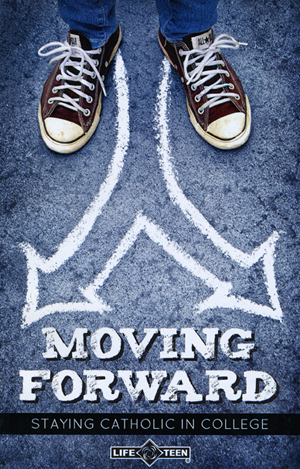
For many of us, college was a wondrous place where we joyfully experienced the transition from the innocence of childhood to the inescapable responsibility of adulthood.
College is that place where Catholic students first meet with the world’s great diversity, where students first take care of themselves, where they must first make the majority of their own decisions, and where their faith is first really tested. Free of the bonds of watchful parents, grandparents, and teachers, Catholic students come in contact with the whole spectrum of the human condition, its experiences and temptations greet them at every turn; in other words, they first learn what it means to “p-a-r-t-y!”
The difficulty, in this environment, of remaining faithful to the teachings and sacraments of the Church can be profound.
Enter, “Moving Forward: Staying Catholic in College,” a book written by members of Life Teen, an organization originating in the Diocese of Phoenix and dedicated to serving teenagers and their spiritual needs.
Because Life Teen began in 1985, and as Life Teen members have grown older, they are naturally inclined to continue their work. No longer being teenagers, a book about college life is natural. Continuing this trend, we can only hope in a future book for the rest of us: “Still Moving Forward, However Slowly: Staying Catholic in Life.”
We can find books out there — not many — that pontificate upon the college condition, extolling the virtues and warning of the sins, but this book digs deep into the whole experience, from handling the vagaries of newfound freedom, to making decisions, to developing a rhythm — we’ve all got rhythm — of prayer and spiritual life, to college prep.
Following these bits of contemporary wisdom, the book contains no less than 53 separate chapters on handling the specifics of college life, everything from college choice, to roommates, chastity, relationships, profanity, and campus ministry, practically everything a college student could ever imagine except for, possibly, space travel and the rules of curling, that odd, though thoroughly entertaining Olympic sport.
The language of the book reaches deliberately for the budding intellectual and the someday scholar. Here is an example from the chapter on decorating the dorm room: “The Barbie Threw Up Dorm Room: You like the color pink, a lot, in fact, you’re purposefully dating a guy named Ken. But don’t let the other colors in the spectrum be lonely. Try using two colors as your foundation, rather than one.”
Sounds silly, doesn’t it? The point of the chapter, however, is that something as mundane as decorating a dorm room says plenty about who each of us is as a person — i.e. an outward sign of an interior mystery. Thus, the wisdom is something that we all can use without having to wait for Life Teen’s next book for all the rest of us who either already graduated from college or were summarily tossed out for undisclosed reasons.
The book’s treatment of spirituality as a foundation for all our lives is simple, splendid, wise, and enduring. The chapters on spiritually cover: campus ministry, discipleship, discernment (always a word for vocations!), faith, and prayer. The premise upon which spirituality and faith for college students is discussed is the same principle that guides all of Christian faith — free will. College students will not find their parents monitoring their Church attendance, nor will a priest knock on the dorm room door demanding to know why the student didn’t attend Mass. The responsibility rests with the student, just as adults are completely responsible for their own faith life and their own faithfulness to Church teaching.
Because of the tension between faith and daily life that many Catholic college students experience, the notion of separation of Church and state is a very large problem, for the students and for the Church in the United States at large; even many Catholics believe that this means keeping all religious expression out of the public arena.
I once heard a Catholic make this claim about separation in a discussion about a Catholic politician’s responsibility toward Church teaching. The Compendium of the Social Doctrine of the Church states: “The Second Vatican Council sees the separation of Christian faith and daily life as one of the most serious errors of our day” (§554).
“Moving Forward: Staying Catholic in College” takes the Second Vatican Council’s approach as the book addresses the daily life of college students with practical wisdom mixed generously with Church teaching. The book is a good and entertaining read that would serve anyone who wants to know how to stay Catholic in life.
– – –
Robert Curtis, a life-professed Lay Dominican, is founder of Catholic First, USA, www.catholicfirst-usa.org. He is the author of 17 books, most recently, “Surfer Joe,” which is available on www.amazon.com. He holds a master’s degree in creative writing, teaches composition at the University of Phoenix and creative writing at Rio Salado College.






